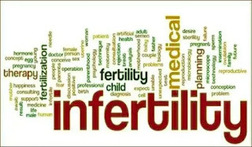Causes of Female infertility
Most causes of female infertility are caused by problems with ovulation. Without ovulation, there are no eggs to be fertilized. Some signs that a woman is not ovulating normally include irregular or absent menstrual periods.
 Ovulation problems are often caused by polycystic ovarian syndrome (PCOS). PCOS is a hormone imbalance problem which can interfere with normal ovulation. PCOS is the most common cause of female infertility. Primary ovarian insufficiency (POI) is another cause of ovulation problems. POI occurs when a woman's ovaries stop working normally before she is 40. POI is not the same as early menopause.
Ovulation problems are often caused by polycystic ovarian syndrome (PCOS). PCOS is a hormone imbalance problem which can interfere with normal ovulation. PCOS is the most common cause of female infertility. Primary ovarian insufficiency (POI) is another cause of ovulation problems. POI occurs when a woman's ovaries stop working normally before she is 40. POI is not the same as early menopause.
Less common causes of fertility problems in women include:
 Ovulation problems are often caused by polycystic ovarian syndrome (PCOS). PCOS is a hormone imbalance problem which can interfere with normal ovulation. PCOS is the most common cause of female infertility. Primary ovarian insufficiency (POI) is another cause of ovulation problems. POI occurs when a woman's ovaries stop working normally before she is 40. POI is not the same as early menopause.
Ovulation problems are often caused by polycystic ovarian syndrome (PCOS). PCOS is a hormone imbalance problem which can interfere with normal ovulation. PCOS is the most common cause of female infertility. Primary ovarian insufficiency (POI) is another cause of ovulation problems. POI occurs when a woman's ovaries stop working normally before she is 40. POI is not the same as early menopause.Less common causes of fertility problems in women include:
- Blocked fallopian tubes due to pelvic inflammatory disease, endometriosis, or surgery for an ectopic pregnancy
- Physical problems with the uterus
- Uterine fibroids, which are non-cancerous clumps of tissue and muscle on the walls of the uterus.
What things increase a woman's risk of infertility?
Many things can change a woman's ability to have a baby. These include:
- Age
- Smoking
- Excess alcohol use
- Stress
- Poor diet
- Athletic training
- Being overweight or underweight
- Sexually transmitted infections (STIs)
- Health problems that cause hormonal changes, such as polycystic ovarian syndrome and primary ovarian insufficiency
How does age affect a woman's ability to have children?
Many women are waiting until their 30s and 40s to have children. In fact, about 20 percent of women in the United States now have their first child after age 35. So age is a growing cause of fertility problems. About one-third of couples in which the woman is over 35 have fertility problems.
Aging decreases a woman's chances of having a baby in the following ways:
Aging decreases a woman's chances of having a baby in the following ways:
- Her ovaries become less able to release eggs
- She has a smaller number of eggs left
- Her eggs are not as healthy
- She is more likely to have health conditions that can cause fertility problems
- She is more likely to have a miscarriage
How long should women try to get pregnant before calling their doctors?
Most experts suggest at least one year. Women 35 or older should see their doctors after six months of trying. A woman's chances of having a baby decrease rapidly every year after the age of 30.
Some health problems also increase the risk of infertility. So, women should talk to their doctors if they have:
It is a good idea for any woman to talk to a doctor before trying to get pregnant. Doctors can help you get your body ready for a healthy baby. They can also answer questions on fertility and give tips on conceiving.
Some health problems also increase the risk of infertility. So, women should talk to their doctors if they have:
- Irregular periods or no menstrual periods
- Very painful periods
- Endometriosis
- Pelvic inflammatory disease
- More than one miscarriage
It is a good idea for any woman to talk to a doctor before trying to get pregnant. Doctors can help you get your body ready for a healthy baby. They can also answer questions on fertility and give tips on conceiving.


